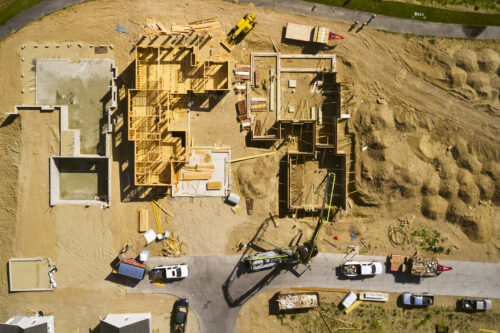
RMI Launches HomebuildersCAN to Tackle Embodied Carbon in North American Homes
The Carbon Action Network provides a community of practice for homebuilders to learn about embodied carbon and adopt sustainable construction practices using materials that are climate-smart and cost-competitive.
Basalt, Colorado
Today, RMI (founded as Rocky Mountain Institute) is proud to announce the launch of HomebuildersCAN (Homebuilders Carbon Action Network). Developed with an industry stakeholder group and supported by more than 50 builders and affiliates across North America, HomebuildersCAN aims to help the industry to understand, measure, and reduce embodied carbon in residential homes while maintaining profitability and performance.
Embodied carbon, which is responsible for of global carbon pollution according to the World Green Building Council, includes the millions of tons of Earth-warming emissions released during the life cycle of building products, including raw material extraction, manufacturing, transport, construction, and disposal. The carbon footprint of the materials for new homes in the United States is staggering, with embodied carbon emissions from the industry equivalent to emissions from entire countries such as Ireland and Denmark. HomebuildersCAN is looking to bend the curve on this.
The initiative from RMI follows closely in the footsteps of Building Transparency’s CAN groups that are comprised of leaders in the global building industry who are taking aim at embodied carbon in building materials such as concrete, steel, aluminum, and insulation. Like these programs, HomebuildersCAN provides a network for builders, energy raters, and industry experts to collaborate and engage through online workshops and webinars; it will also provide access to new case studies, tools, and guides focused on embodied carbon reduction strategies. Homebuilders who join will benefit from training in calculating and reporting emissions, direct consultation on construction projects and innovative solutions, information about funding opportunities, and more.
“Reducing embodied carbon is a critical action to help stop the Earth from overheating that also happens to be economically beneficial and highly achievable for homebuilders,” said RMI embodied carbon expert Chris Magwood, a former homebuilder for 25 years who is overseeing HomebuildersCAN. “Through smart material choices and simple interventions, builders can substantially lower carbon emissions without compromising cost or performance. RMI is thrilled to support home builders in making these improvements and connecting them with peers and industry experts for continuous growth and success.”
As demands from homebuyers, investors, and regulations to incorporate environmentally friendly practices increase, so too will the need for homebuilders to factor embodied carbon into their decision-making. Fortunately, builders and designers can immediately reduce the carbon footprint of new homes by 30%–50% using existing material solutions without significant disruption to current practices. RMI research shows they can do so by targeting just a few key material categories: concrete, insulation, cladding, and interior surfaces, which together typically represent more than 70% of the total emissions of new home construction.
The introduction of HomebuildersCAN has garnered enthusiastic support from several industry leaders, highlighting the momentum to embrace this new frontier of sustainable home design and construction. Mattamy Homes, North America’s largest privately owned homebuilder, is among the early supporters of the program. “We all face the same challenges regarding design, supply, execution, and affordability. HomebuildersCAN provides a platform for industry-wide collaboration towards decarbonizing our sector,” said Phil Santana, Mattamy Homes’ manager of sustainable development.
“EEBA is proud to support HomebuildersCAN in fostering radical collaboration to drive attention to embodied carbon and scale efforts across the homebuilding sector,” said Aaron Smith, CEO of the Energy & Environmental Building Alliance (EEBA). “Decarbonization is a top priority, and HomebuildersCAN provides a vital platform for stakeholders to come together.”
Today’s official launch event for HomebuildersCAN will be hosted online at 11:00 a. m. ET and showcase practical strategies for reducing embodied carbon, including a study on the benefits of improved airtightness in homes — one of the most effective strategies for reducing both the embodied carbon and increasing the energy efficiency of homes — a true win-win scenario. Those who sign up to become members will have access to free monthly workshops, webinars, and a summit on embodied carbon scheduled for October 1st, preceding the annual EEBA Summit in Salt Lake City.
RMI invites homebuilders, energy raters, and industry stakeholders to join forces in reducing embodied carbon and shaping a more sustainable future for the homebuilding industry.
For more information and to join the network, visit www.rmi.org/homebuilderscan
About RMI:
Rocky Mountain Institute (RMI) is an independent, nonpartisan nonprofit founded in 1982 that transforms global energy systems through market-driven solutions to secure a prosperous, resilient, clean energy future for all. In collaboration with businesses, policymakers, funders, communities, and other partners, RMI drives investment to scale clean energy solutions, reduce energy waste, and boost access to affordable clean energy in ways that enhance security, strengthen the economy, and improve people’s livelihoods. RMI is active in over 60 countries. Find more information at www.rmi.org and follow us on LinkedIn @RMI.